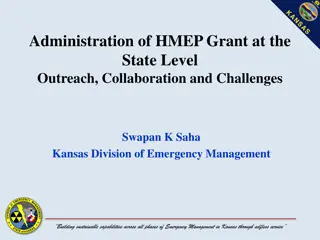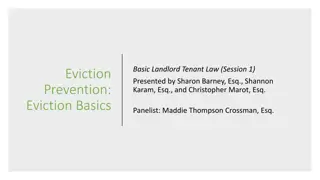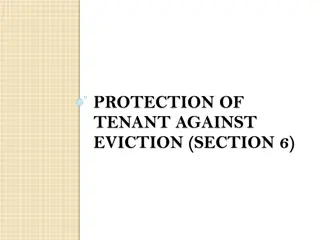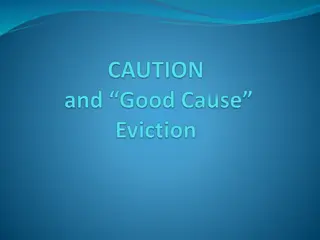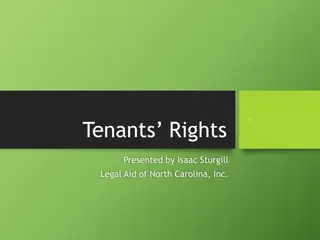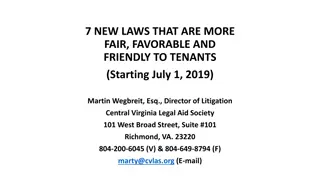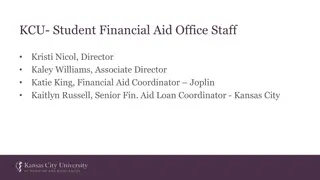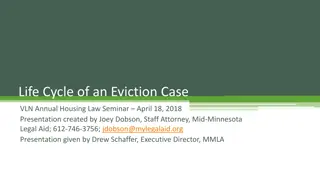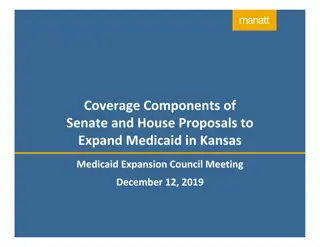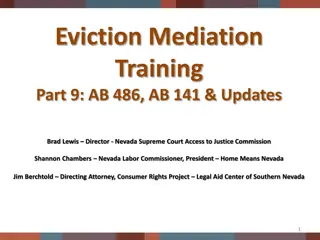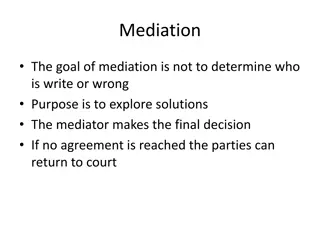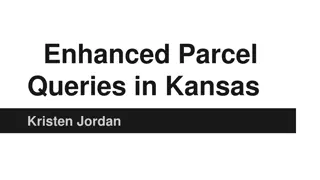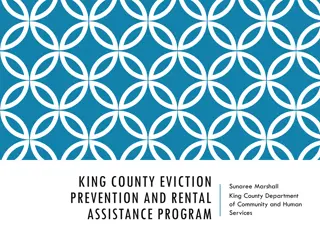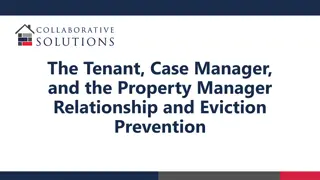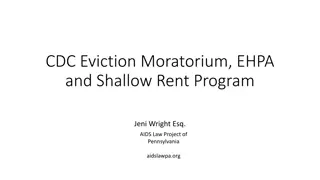Eviction Defense Overview in Kansas
Learn about eviction defense strategies, statutes, and procedures in Kansas under the Residential Landlord and Tenant Act. Explore important definitions and rental agreement terms to understand your rights as a tenant.
Download Presentation

Please find below an Image/Link to download the presentation.
The content on the website is provided AS IS for your information and personal use only. It may not be sold, licensed, or shared on other websites without obtaining consent from the author.If you encounter any issues during the download, it is possible that the publisher has removed the file from their server.
You are allowed to download the files provided on this website for personal or commercial use, subject to the condition that they are used lawfully. All files are the property of their respective owners.
The content on the website is provided AS IS for your information and personal use only. It may not be sold, licensed, or shared on other websites without obtaining consent from the author.
E N D
Presentation Transcript
Eviction Defense By Casey Johnson, Kansas Legal Services Director of Advocacy and Litigation johnsonc@klsinc.org And Nick Blessing, Kansas Legal Services Staff Attorney blessingn@klsinc.org
Agenda Evictions Statutes and Rules Eviction Procedure Affirmative Defenses Counterclaims Writs of Restitution Setting Aside Default Judgments
Disclaimer I have modified the language of several of the statutes and regulations to make them easier to read and understand.
Statutes and Codes Kansas Residential Landlord and Tenant Act (KRLTA) K.S.A. 58-2540, et seq. Mobile Home Parks Residential Landlord and Tenant Act (MHPRLTA) K.S.A. 58-25,101, et seq. Eviction Statutes under the Code of Civil Procedure for Limited Actions K.S.A. 61-3801, et seq.
Handbooks & Housing Choice Voucher (HCV) Administrative Plans The Kansas Tenants Handbook can be found at: https://hcci- ks.org/programs/rental-housing-counseling/tenants The HUD Occupancy Requirements of Subsidized Multifamily Housing Programs Handbook can be found at: https://www.hud.gov/program_offices/administration/hudclips/handbooks/h sgh/4350.3 Housing Authority Administrative/Admission & Continued Occupancy Policies (ACOP) Plans can usually be found on their website.
Important Definitions 58-2543. Definitions. As used in this act: (j) "Rent" means all payments to be made to the landlord under the rental agreement, other than the security deposit. (k) "Rental agreement" means all agreements, written or oral, and valid rules and regulations, embodying the terms and conditions concerning the use and occupancy of a dwelling and premise. (m) "Security deposit" means any sum of money specified in a rental agreement, however denominated, to be deposited with a landlord by a tenant as a condition precedent to the occupancy of a dwelling unit, which sum of money, or any part thereof, may be forfeited by the tenant under the terms of the rental agreement upon the occurrence or breach of conditions specified therein.
Terms and Conditions in Absence of Rental Agreement 58-2545. Rental agreement; terms and conditions in absence of rental agreement. (a) The landlord and tenant may include in a rental agreement, terms and conditions not prohibited by this act or other rule of law. (b) If there is no agreement, the tenant shall pay fair rental value. (c) Rent shall be paid at the time and place agreed upon by the parties. Unless otherwise agreed, rent is payable at the property at the beginning of each month. (d) Unless the rental agreement fixes a definite term, the tenancy defaults to month-to-month.
Prohibited Terms and Conditions 58-2547. Same; prohibited terms and conditions; damages. (a) No rental agreement may provide that the tenant or landlord: (1) Agrees to waive or to forego rights or remedies under this act; (2) authorizes any person to confess judgment on a claim arising out of the rental agreement; (3) agrees to pay either party's attorneys' fees; or (4) agrees to the limitation of any liability of either party except that a rental agreement may provide that a tenant agrees to limit the landlord's liability for fire, theft or breakage with respect to common areas of the dwelling unit. (b) A provision prohibited by subsection (a) included in a rental agreement is unenforceable. If a landlord deliberately uses a rental agreement containing provisions the landlord knows is prohibited, the tenant may recover actual damages.
Inventory of Premises (i.e., Move-In Checklist) 58-2548. Inventory of premises by landlord and tenant. Within five (5) days of the initial date of occupancy or upon delivery of possession, the landlord and the tenant shall jointly inventory the premises. A written record detailing the condition of the premises and any furnishings or appliances provided shall be completed. Duplicate copies of the record shall be signed by the landlord and the tenant as an indication the inventory was completed. The tenant shall be given a copy of the inventory. Failure to do an inventory does not preclude the landlord from filing for damages to the premises. Buettner v. Unruh, 7 Kan.App.2d 359, 362 (1982).
Security Deposits 58-2550. Security deposits. (a) A landlord may not demand or receive a security deposit for an unfurnished dwelling in an amount or value in excess of one month's rent. If the rental agreement provides for the tenant to use furniture owned by the landlord, the landlord may demand and receive a security deposit not to exceed one-half ( ) months' rent. If the rental agreement permits the tenant to keep or maintain pets in the dwelling, the landlord may demand and receive an additional security deposit not to exceed one-half ( ) of one month's rent.
Security Deposits Upon Termination (b) Upon termination of the tenancy, any security deposit held by the landlord may be applied to the payment of accrued rent and any damages. The amount of damages must be itemized by the landlord in a written notice delivered to the tenant. If the landlord wants to keep any portion of the security deposit for expenses, damages, or charges, the landlord shall return the balance of the security deposit to the tenant no later than 30 days after termination of the tenancy. The landlord shall mail the portion of the security deposit due the tenant to the tenant's last known address.
Security Deposits Upon Termination (c) If the landlord fails to comply with subsection (b) of this section, the tenant may recover the portion of the security deposit wrongfully withheld AND one and one-half (1 ) times that amount. (d) Except as otherwise provided by the rental agreement, a tenant shall not apply or deduct any portion of the security deposit from the last month's rent or use or apply such tenant's security deposit at any time in lieu of payment of rent.
Security Deposits Case Law Forfeiture of the security deposit under K.S.A. 60-2550(d) is only effective if actually set forth in the rental agreement. Clark v. Walker, 225 Kan. 359, 367 (1979). A lease provision that allows for a forfeiture of the entire security deposit upon early termination of the lease is prohibited. Wurtz v. Cedar Ridge Apartments, 28 Kan.App.2d 609, 612 (2001). Failure of landlords to comply with the requirement that they provide itemized statements to tenants showing nature of items deducted from security deposit entitles tenants to recover security deposit plus one and one-half the amount of the security deposit. Geiger v. Wallace, 233 Kan. 656, 660 (1983). An award of damages of one and one-half the amount wrongfully withheld from a security deposit is not discretionary with the trial court. Love v. Monarch Apartments, 13 Kan.App.2d 341, 344 (1989).
Duties of Landlord 58-2553. Duties of landlord. (a) The landlord shall: (1) Comply with building and housing codes that materially affect health and safety; (2) exercise reasonable care in the maintenance of the common areas; (3) maintain in good and safe working order and condition all electrical, plumbing, sanitary, heating, ventilating and air-conditioning appliances including elevators, supplied or required to be supplied by such landlord; (4) provide and maintain appropriate receptacles and conveniences for the removal of trash and arrange for its removal; and (5) supply running water and reasonable amounts of hot water at all times and reasonable heat. (b) & (c) The landlord and tenants of a dwelling may agree in writing that the tenant is to perform the landlord's duties ONLY if the transaction is entered into in good faith and not for the purpose of evading the obligations of the landlord.
Warranty of Habitability A landlord s duties under K.S.A. 58-2553 are in addition to the common law, general warranty of habitability. Claus v. Deware Enterprises, L.L.C., 136 P.3d 964 (2006) (unpublished case citing Steele v. Latimer, 214 Kan. 329, 333 (1974), which was decided prior to the enactment of the KRLTA).
Duties of Tenant 58-2555. Duties of tenant. The tenant shall: (a) Comply with all obligations primarily imposed upon tenants by building and housing codes that materially affect health and safety; (b) keep that part of the premises that such tenant occupies and uses as clean and safe as the condition of the premises permit; (c) remove from such tenant's dwelling all ashes, rubbish, garbage and other waste in a clean and safe manner;
Duties of Tenant (d) keep all plumbing fixtures in the dwelling or used by the tenant as clean as their condition permits; (e) use in a reasonable manner all electrical, plumbing, sanitary, heating, ventilating, air-conditioning and other facilities and appliances, including elevators in the premises; (f) be responsible for any destruction, defacement, damage, impairment or removal of any part of the premises caused by an act or omission of the tenant or by any person or animal or pet on the premises at any time with the express or implied permission or consent of the tenant; (g) not engage in conduct or allow any person or animal or pet, on the premises with the express or implied permission or consent of the tenant, to engage in conduct that will disturb the quiet and peaceful enjoyment of the premises by other tenants.
Rules and Regulations of Landlord 58-2556. may adopt rules or regulations concerning the tenant's use and occupancy of the premises. Any such rule or regulation is enforceable against the tenant only if: Rules and regulations of landlord; when enforceable. A landlord (a) Its purpose is to promote the convenience, safety, peace or welfare of the tenants in the premises, preserve the landlord's property from abusive use, or make a fair distribution of services and facilities for the tenants; (b) it is reasonably related to the purpose for which it is adopted; (c) it applies to all tenants equally;
Rules and Regulations of Landlord (d) it is sufficiently clear to the tenant what the tenant must or must not do to comply with it; (e) it is not for the purpose of avoiding the duties of the landlord; and (f) the tenant has notice of it at the time the tenant enters into the rental agreement. After the tenant enters into the rental agreement, if a rule or regulation which effects a substantial modification of the rental agreement is adopted, such rule or regulation is not enforceable against the tenant unless such tenant consents to it in writing.
Landlords Right to Enter 58-2557. Landlord's right to enter; limitations. (a) The landlord shall have the right to enter the dwelling at reasonable hours, after reasonable notice to the tenant, in order to inspect the premises, make necessary or agreed repairs, decorations, alterations or improvements, supply necessary or agreed services, or show the dwelling to potential purchasers, mortgagees, tenants, workmen, or contractors. (b) The landlord may enter the dwelling without consent of the tenant in case of an extreme hazard involving the potential loss of life or severe property damage. (c) The landlord shall not abuse the right of access or use it to harass the tenant.
Access and Entry 58-2571. Tenant's refusal to allow lawful access and landlord's unlawful or unreasonable entry. (a) If the tenant refuses to allow lawful access to the dwelling, the landlord may obtain injunctive relief to compel access, or may terminate the rental agreement. In either case, the landlord may recover actual damages. (b) If the landlord makes an unlawful entry, or a lawful entry in an unreasonable manner, or makes repeated demands for entry otherwise lawful but which unreasonably harass the tenant, the tenant may obtain injunctive or may terminate the rental agreement. In either case, the tenant may recover actual damages.
Extended Absence and Abandonment 58-2565. Extended absence or abandonment by tenant. (a) If the rental agreement requires the tenant to give notice to the landlord of an anticipated extended absence in excess of seven days and the tenant willfully fails to do so, the landlord may recover actual damages. (b) During any absence of the tenant more than 30 days, the landlord may enter the dwelling at times reasonably necessary. If the tenant is 10 days late or more on rent and has removed a substantial portion of their belongings from the dwelling, the landlord may assume that the tenant has abandoned the dwelling, unless the tenant has notified the landlord to the contrary. (c) If the tenant abandons the dwelling, the landlord shall make reasonable efforts to rent it at a fair rental. If the landlord rents the dwelling prior to the expiration of the rental agreement, the rental agreement is terminated as of the date the new tenancy begins.
Personal Property Left at Dwelling (d) If the tenant moves out or is evicted from the dwelling and leaves personal property there, the landlord may take possession of the property, store it at tenant's expense and sell or otherwise dispose of the same upon the expiration of 30 days after the landlord takes possession of the property, if: At least 15 days prior to the sale or other disposition of such property the landlord shall publish once in a newspaper a notice of the landlord's intention to sell or dispose of such property; and Within seven days after publication, a copy of the published notice shall be mailed by the landlord to the tenant at the tenant's last known address. If these requirements are met, the landlord may sell or dispose of the property. The tenant may redeem the property upon payment to the landlord of the reasonable expenses incurred by the landlord of taking, holding and preparing the property for sale and of any amount due from the tenant to the landlord for rent or otherwise.
Acceptance of Late Rent 58-2566. Acceptance of late rent; effect. Acceptance of late payment of rent from the tenant without reservation by the landlord, or acceptance of performance by the tenant, other than for payment of rent, that varies from the terms of the rental agreement, constitutes a waiver of the landlord's right to terminate the rental agreement for that breach, unless otherwise agreed after the breach has occurred.
Unlawful Removal or Diminished Services 58-2563. Unlawful removal or exclusion of tenant or diminished services. If the landlord, prior to getting a court judgment, locks the tenant out or in bad faith diminishes services to the tenant by turning off the electric, gas, water or other essential services to the tenant, the tenant may recover possession or terminate the rental agreement and, in either case, recover an amount not more than one and one-half (1 ) months' rent or the damages sustained by the tenant, whichever is greater.
Failure to Deliver Possession K.S.A. 58-2552 - At the commencement of the term the landlord shall deliver possession of the premises to the tenant in compliance with the rental agreement and K.S.A. 58-2553 (duties of the landlord). The landlord may bring an action for possession against any person wrongfully in possession and may recover the damages provided in subsection (c) of K.S.A. 58-2570. K.S.A. 58-2560 - If the landlord fails to deliver possession of the dwelling unit to the tenant as provided in K.S.A. 58-2552, rent abates until possession is delivered and the tenant: (a) Upon at least five days' written notice to the landlord, may terminate the rental agreement and upon termination the landlord shall return all of the security deposit; or b) may demand performance of the rental agreement by the landlord and, if the tenant elects, maintain an action for possession of the dwelling unit against the landlord, or any person wrongfully in possession, and recover the damages sustained by such tenant. If a person's failure to deliver possession is willful and not in good faith, an aggrieved party may recover from such person an amount not more than one and one-half (1 1/2) months' periodic rent or one and one-half (1 1/2) times the actual damages sustained by such party, whichever is greater.
Material Noncompliance by Landlord 58-2559. Material noncompliance by landlord. (a) If the landlord materially fails to comply with the rental agreement or their legal duties that materially affect health and safety, the tenant may deliver a written,14/30 day notice to the landlord specifying the breach and that the rental agreement will terminate on a rent-paying date not less than thirty (30) days after receipt of the notice. (b) The tenant may recover damages and obtain injunctive relief for any noncompliance by the landlord with the rental agreement or their legal duties.
Habitability Substantially Impaired 58-2562. Damage or destruction by fire or casualty; termination of rental agreement; notice; vacation of part of dwelling; reduction of rent; security deposit. (a) If the dwelling unit or premises are damaged or destroyed by fire or casualty to an extent that the use and habitability of the dwelling unit is substantially impaired, the tenant: (1) May vacate the premises immediately and shall notify the landlord in writing within five (5) days thereafter of such tenant's intention to terminate the rental agreement, in which case the rental agreement terminates as of the date of vacating; or (2) if continued occupancy is lawful, may vacate any part of the dwelling unit rendered unusable by the fire or casualty, in which case the tenant's liability for rent is reduced in proportion to the diminution in the fair rental value of the dwelling unit.
Material Noncompliance by Tenant 58-2564. Material noncompliance by tenant. (a) If the tenant materially fails to comply with the rental agreement or a noncompliance with their legal duties that materially affecting health and safety, the landlord may deliver a written, 14/30 day notice to the tenant specifying the breach and that the rental agreement will terminate upon a date not less than 30 days after receipt of the notice, if the breach is not remedied in 14 days. (b) The landlord may terminate the rental agreement if rent is unpaid when due and the tenant fails to pay rent within three days, after written notice by the landlord of nonpayment and such landlord's intention to terminate the rental agreement if the rent is not paid within such three-day period. (c) The landlord may recover damages and obtain injunctive relief for any noncompliance by the tenant with the rental agreement or their legal duties.
Termination of Tenancy 58-2570. Termination of tenancy; holdover by tenant. (b) The landlord or the tenant may terminate a month-to-month tenancy by a written notice given to the other party stating that the tenancy shall terminate on a rent-paying date not less than 30 days after the receipt of the notice, Only 15 days' written notice by a tenant shall be necessary to terminate any such tenancy where the termination of the tenancy is necessitated by U.S. military orders. (c) If the tenant remains in possession without the landlord's consent after expiration of the term of the rental agreement or its termination, the landlord may bring an action for possession. In addition, if the tenant's holdover is willful and not in good faith the landlord may recover an amount not more than one and one-half (1 ) months' periodic rent or not more than one and one-half (1 ) times the actual damages sustained by the landlord, whichever is greater.
Notice to Leave Premises 61-3803. Notice to leave premises. Before a landlord files an eviction lawsuit to evict a person is filed, the landlord must deliver to the tenant a notice to leave the premises. The notice shall be delivered at least three days before filing, by leaving a written copy with the other party or by leaving a copy with any person over the age of 12 years residing in the premises, or if no one is home, by posting a copy of such notice in a conspicuous place, or by mailing a copy of the notice to the other party. The three day notice period is three consecutive 24-hour periods starting at the time the notice is delivered, posted or mailed. If the notice is mailed, an additional two days shall be allowed for the person to leave the premises before the lawsuit is filed. Saturdays, Sundays, legal holidays, and days on which the court is not accessible shall be included in the computation of the notice period. The notice may be combined with any notice provided for in the Residential Landlord and Tenant Act.
Notice Case Law If a landlord fails to give a tenant notice of termination of lease on a definite date for a specified breach without informing tenant of his right to remedy breach within 14 days, the landlord forfeits the right to collect damages in form of unpaid rents from time of forfeiture until premises are rerented. Fenn v. Windsor at Kingsborough, Inc., 226 Kan. 653, 656 57 (1979). A forcible detainer action is summary in character. The statutory remedy must be strictly pursued and the facts which give jurisdiction must appear affirmatively on the face of the record, otherwise the proceedings will be not merely voidable, but absolutely void. Goodin v. King, 192 Kan. 304, 307 08, (1963) (citations omitted) (specifically referring to three-day notice to leave in K.S.A. 61-3803).
Eviction Procedure (K.S.A. Chapter 61, Article 38) The landlord gives the tenant notice. Both a notice to terminate the lease (K.S.A. 58-2564(a), (b), K.S.A. 58-2570(a), OR (b)) AND a notice to leave (K.S.A. 61-3803) are required. The landlord files a petition in court. The tenant receives a summons to appear in court between 3-14 days after the landlord files. This is called the answer hearing. The tenant shall appear in person, appear by counsel, or file a written answer before the answer hearing. If the tenant appears at the answer hearing and denies the allegations in the petition, then a trial must be set within 14 days.
Eviction Procedure (K.S.A. Chapter 61, Article 38) The tenant must file a written answer (K.S.A. 61-2904) and may file a counterclaim (K.S.A. 61-2905). A counterclaim is compulsory in nonpayment of rent cases. The trial must be held within 14 days of the answer hearing. No continuance may be granted unless the tenant puts up a bond to cover payment of all damages and rent that may accrue if judgment is entered against the defendant. If the tenant loses, the court issues a writ of restitution. The sheriff has a maximum of 14 days to remove the tenant from the property. See Security Deposits Upon Termination (Slides 13-15) and Personal Property Left at Dwelling (Slide 25). Several provisions of Civil Procedure, Chapter 60, apply (See K.S.A. 61-2912, 61- 3304, discovery statutes, etc.).
Potential Affirmative Defenses Landlord did not follow proper pre-filing requirements (e.g., no option to cure) Landlord did not give tenant 14/30-day notice (K.S.A. 58-2564(a)) Landlord did not give tenant a 3-day notice to leave (K.S.A. 61-3803) Tenant paid rent within 72 hours (K.S.A. 58-2564(b)) Oral Agreement and/or Modification (K.S.A. 58-2543(k)) Written Agreement and/or Modification (K.S.A. 58-2543(k)) Landlord accepted late rent (K.S.A. 58-2566) Rental unit was never delivered ; rent abated (K.S.A. 58-2560(a))
Potential Counterclaims Breach of the warranty of habitability (K.S.A. 58-2559(a) and common law) Unlawful removal or exclusion (K.S.A. 58-2563) Diminished services (K.S.A. 58-2563) Failure to Deliver Possession (K.S.A. 58-2553, 58-2552 & 58-2560) Unlawful entry and/or harassment (K.S.A. 58-2571) Retaliatory eviction (K.S.A. 58-2572) Unconscionability of rental agreement terms (K.S.A. 58-2544) E.g., late fees Theft of property (violation of K.S.A. 58-2565(d) & 58-2567) Unlawful retention of security deposit (K.S.A. 58-2550 (not usually a counterclaim in the actual eviction case because the landlord doesn t have a duty to return the security deposit until after the tenant has left))
Writ of Restitution 61-3808. Writ of restitution. (a) If judgment is entered against the defendant for possession of the subject premises, the court shall issue, at the request of the plaintiff, a writ of restitution which shall direct anyone who is authorized to serve process and who is named in the writ to place the plaintiff in possession of the premises described in the writ. (b) The writ of restitution shall be executed within 14 days after the person named in the writ receives it, and that person shall file a return as with other writs under the code of civil procedure for limited actions. The person serving the writ may use such reasonable force as is necessary to execute the writ. (c) If the person named in the writ receives a notice from the court that the proceedings have been stayed by appeal, that person shall immediately delay all further proceedings upon the execution. If the premises have been restored to the plaintiff, the person named in the writ shall immediately place the defendant in the possession thereof.
Setting Aside a Default Judgment 61-3301. Default judgment. (c) If a defendant seeks to set aside a default judgment for failure to appear at the time specified in the summons (i.e., the tenant failed to appear at the answer hearing), the defendant shall file a motion not more than 14 days from the date of such judgment in a lawsuit where the defendant was personally served with summons within the state, or not more than 45 days where service of summons was by other than personal service within the state. If any party seeks to set aside any other default judgment, that party shall file a motion not more than 14 days from the date of such judgment. Any motion to set aside a default judgment, except for the time limits set forth above, shall be in accordance with the applicable provisions of subsection (b) of K.S.A. 60-260, and amendments thereto.
Other Requirements to Set Aside Default Judgment The Kansas Supreme Court has held that a motion to set aside a default judgment may be granted whenever the court finds that the non-defaulting party will not be prejudiced by the reopening of the case, the defaulting party has a meritorious defense, and the default did not result from inexcusable neglect or a willful act. Jenkins v. Arnold, 223 Kan. 298, 300 (1978). The moving party is not required to show that she has a meritorious defense when a judgment is attacked under K.S.A. 60-260(b)(4) as being void. In re Marriage of Hampshire, 261 Kan. 854, 862 (1997).
What Makes a Judgment Void? The Court lacks subject matter jurisdiction because the landlord served a defective notice A forcible detainer action is summary in character. It is purely statutory and a party desiring to avail himself of the remedy must bring himself clearly within the provisions of the law in order to vest the court with jurisdiction. Goodin v. King, 192 Kan. 304, 307 387 P.2d 206, 208 (1963). Because a forcible detainer action is a special statutory proceeding in derogation of the common law, the statute conferring jurisdiction must be strictly pursued or jurisdiction will fail to attach, and the proceeding will be coram non judice and void. Id. at 307 08. In Goodin v. King, the Kansas Supreme Court held that where a landlord s notice to a tenant did not strictly comply with the three-day notice to leave statute which governed at the time, the landlord could not maintain the forcible detainer action. Id. See also, Gunter v. Eiznhamer, 165 Kan. 510 (1948). A judgment rendered without subject matter jurisdiction is simply void. Miller v. Glacier Development Co., L.L.C., 293 Kan. 665, 672 (2011).
What Makes a Judgment Void (continued) The Court acted in a manner inconsistent with Due Process. A judgment entered by a court acting inconsistent with due process is void. In re Marriage of Hampshire, 261 Kan. 854, 862 (1997). The fundamental requirement of due process is the opportunity to be heard at a meaningful time and a meaningful manner. Mathews v. Eldridge, 424 U.S. 319, 333 (1976). Unlike some legal rules, due process does not have fixed content unrelated to time, place, and circumstances. It is flexible and calls for such procedural protections as the particular situation demands. Id. at 334. More specifically, due process requires consideration of three factors: (1) the private interest that will be affected; (2) the risk of an erroneous deprivation of such interest through the procedures used and the probable value, if any, of additional or substitute procedural safeguards; and (3) the government s interest, including the function involved and the fiscal and administrative burdens that the additional or substitute procedural requirement would entail. Id. at 335.
If the judgment is void, there is no time limitation to file a motion to set aside The clear consensus is that a motion made to set aside a void judgment can be made at any time, since the passage of time cannot cure the defect in the judgment. Barkley v. Toland, 7 Kan. App.2d 625, 630 (1982).
Modification of Judgment 61-2912. Adoption by reference of certain provisions of article 2 of chapter 60. (j) K.S.A. 60-259 concerning new trial , except that the time to file a motion for new trial or to alter or amend judgment when a judgment is rendered by a district magistrate judge is 14 instead of 28 days; (k) K.S.A. 60-260 concerning relief from judgment or order; 61-3304. Modification of judgment. Except as modified by subsections (h) and (j) of K.S.A. 61-2912, and amendments thereto, the provisions of K.S.A. 60-252, 60-259 and 60-260, and amendments thereto, shall apply to judgments entered under the code of civil procedure for limited actions where such provisions are not inconsistent with other provisions of the code.
Questions? Casey Johnson, Kansas Legal Services Director of Advocacy and Litigation johnsonc@klsinc.org



